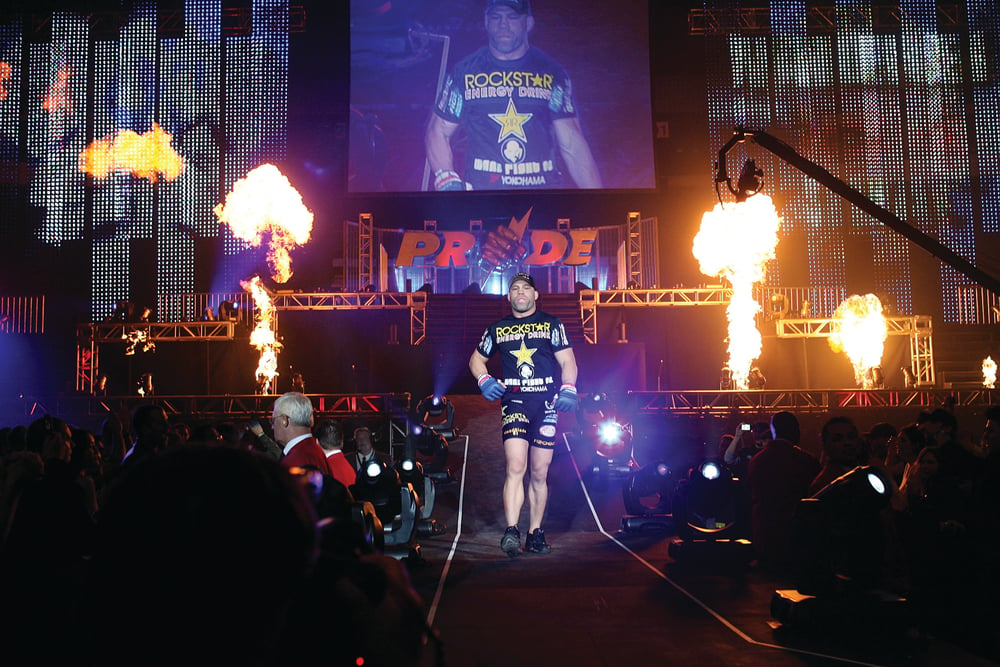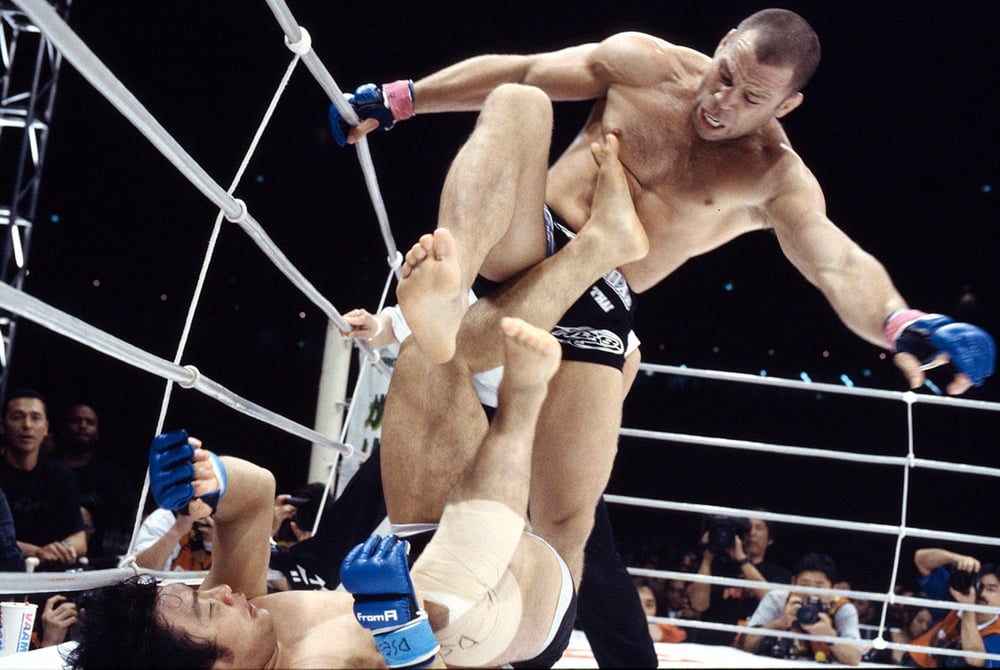
Issue 123
December 2014
Wanderlei Silva went from brawling in Brazil to conquering the world by way of a Japanese ring. ‘The Axe Murderer’ looks back over the most treasured career in
the history of Pride.
As far as Pride superstars go, few men were more popular with fans than middleweight great Wanderlei Silva.
When ‘The Axe Murderer’ entered into combat in the Pride ring the atmosphere became electric. The techno beats of Darude’s Sandstorm hit the airwaves, announcer Lenne Hardt screamed his name, and when Wanderlei appeared shadowboxing and rolling his wrists anticipation in the arena would reach fever pitch.
Intimidation, joy, fear, excitement, trepidation, suspense – when Wanderlei stepped into the ring the Richter scale for world-class live sport would go off the charts. Something special happens when a supercharged Wanderlei enters a fight and the fans responded to that.
Over the course of his glittering 18-year hall-of-fame-worthy career, Silva would, of course, go onto become one of the UFC’s biggest stars. But that was born out of his emergence as a superstar first and foremost in Pride, where he reigned as middleweight champion for more than six years.
His 22-4-1 (1 NC) run with the Japanese promotion featured 15 TKO or KO finishes due to his lethal Thai knees, stomps, punches and his own favorite Pride FC finish, soccer kicks. Plus, his line-up of victims included a who’s who of top stars, including Dan Henderson, ‘Rampage’ Jackson (twice) and Kazushi Sakuraba (thrice).
The only blemishes on his Pride résumé came when he was handed the toughest tests. Heavyweights Mark Hunt and Mirko ‘Cro Cop’ (twice) got the better of the natural 205lb’er when he moved up a weight division.
Back at his usual home, a defeat to Ricardo Arona at Pride Final Conflict 2005 was avenged four months later and he suffered a knockout loss in his final outing for the promotion at Pride 33 in Las Vegas, when he was KO’d in the final round in a second fight with Dan Henderson.
Yet despite those losses, in the Pride ring Wanderlei Silva was a god amongst men. An immortal champion who would fight anybody and never hold back. At the beginning of the millennium there was no prizefighter on the planet adored more than the Curitiba crowd pleaser.

Looking back over his stellar Pride stint, Wanderlei shares with FO: “I can’t really tell you how proud I am. The words don’t exist. Pride gave me the opportunity to feel the sensation of being so much more than just a normal guy. I grew up in Fortaleza, Brazil. The guys put me in the ring to fight in front of 100,000 people in the biggest shows in the world.
“I was on the big screens, all the lights and the cameras, on TV, it was an unbelievable sensation. When I fought in the huge stadiums I fought in main events. The Japanese fans were generally quiet, but when I had some of my knockouts they would jump up and cheer, everybody was on their feet.
“Man, those days were some of the best days of my life. Just that vibration, that energy, they are some of the moments that I will remember for the rest of my life.”
With so many highlight-reel moments from his days in the famous white ring, fans could debate for hours about the very best of Silva’s Pride career. But the man himself holds no reservations. He reveals the fights that mattered most are also the ones closest to his heart.
“When I beat Sakuraba the first time, that was the day Wanderlei Silva was born,” he states. “That day changed my life forever.” It was also the first in a trilogy of TKO victories over the legendary Japanese fighter, by then already established as the infamous ‘Gracie Hunter’, establishing Wanderlei as the planet’s leading middleweight.
“When I fought him the first time he was like the Anderson Silva of the time. He beat a lot of Brazilian guys and after I won it changed my life, it changed my name and what it meant,” Silva says.
“The second time I fought him was for the belt. It’s different now, but back in the day it was tough. About a week before the fight I checked my weight and it was 92kg (202lb). But when I went to the locker room for the fight the promoter said, ‘Hey, we need to check your weight again.’ We said that we checked my weight yesterday, but he said, ‘No, we need to check your weight now.’ So we checked my weight and I now weighed 96kg (211lb)!
“They said I needed to drop the extra weight in order to fight and I was told to go and sweat off the weight in a wooden sauna, outside of the Tokyo Dome in a club. So I went and I sat in the sauna for an hour and a half to lose the kilos to fight. I had to check my weight again before they would let me fight.”
Thankfully, the title match did go ahead and just as he had done at Pride 13, Wanderlei recorded another brutal TKO victory to claim the belt.
As champion, he dominated. He went on a 13-fight unbeaten run with the promotion all the way to the momentous 2003 Middleweight Grand Prix. In the opening round he KO’d Sakuraba once again to progress towards the first encounter in another career-defining rivalry. This time with Quinton Jackson.
Wanderlei and Rampage fought twice in Pride and the Brazilian looks back with his own pride on both victories – each achieved by way of trademark Muay Thai knees. But he also takes a moment to pay credit to the man who almost spoiled the first – Japanese judoka Hidehiko Yoshida.
Wanderlei had to come through one of the toughest fights of his career in the Grand Prix semi-final, just hours before he met Rampage for the first time. He admits his Lord Almighty played a part in his success. “Yoshida was a surprise, man,” he says, rolling his eyes and recalling the 2003 fight of the year.
“I never fought him before and I didn’t know who he was. He was a gold medalist in judo, a guy from judo fighting with the gi. I thought I was going to beat him in two minutes and then I would get ready for the final, but man that fight was tough. He was so strong and he hits hard. My stand-up is a lot better than his but he came to fight. That fight was hard.
“I went the distance with him and I went back to the locker room and my whole body hurt. I was tired. My fingers hurt, my head, my legs and I thought, ‘Man, now I have to fight against Rampage, my biggest rival!’ The fight with your mind is the biggest fight. So I prayed to God to help me. I was not 100%. I asked him to please help me. I had good energy and had a good fight and I am so glad for that.”

Wanderlei’s two knockouts of Rampage in Pride are some of the most replayed moments in MMA history. With thudding Thai knees, it was ‘The Axe Murderer’ at his most motivated and murderous best.
“My two fights against Rampage were both very good. The first one was good, but the second was one of the best knockouts in history. That was one of the most aggressive, devastating knockouts in the history of the sport. When Rampage was knocked out and fell into the ropes it looked like he was dead! I had never seen a dead person before but it was amazing. That was one of my best performances.”
Not surprisingly, the Japanese fans adored Silva’s crazed persona and his vicious, unforgiving fighting style. And in return, Wanderlei found a second home in the Land of the Rising Sun.
“I love the fans in Japan,” he says with a smile. “They treated me so well. Just walking the streets people would be shaking when they came up to talk to me. Japan is an unbelievable place to fight. Japanese fans look at fighters in a different way.
“They look at fighters like they are the new samurai. They look at us with such honor and respect. We represented different things for them, not just fighting. We were looked at differently and treated differently, with a lot of respect. I am so glad to be a part of that part of the history of MMA.”
He adds: “Even my very first fight there, at Pride 7 against Carl Malenko, was unbelievable. In that first event I fought in front of 60,000 people in Yokohama. When I was in Brazil the most people I fought in front of was probably less than 4,000 people. That’s when you realize 60,000 people is a lot of people!
“Every fight was a good fight that night too. They were all classic fights. All the fights were great fights with big name fighters fighting. I fought on the same card as so many great fighters that night. It was a great experience.”
He adds: “Pride was special man. Pride was different than anything else. It was huge and I will never forget it. It was the greatest time of my life.”
Wand on... the best of Pride
“The thing I miss most about Pride? Lenne Hardt, the Pride announcer, her voice is amazing. She was unbelievable. When she would announce the fighters it was one of the most special moments of the event. Pride never dies!”
Wand on... Pride rules or unified rules?
“For me the unified rules take away my best techniques.The kicks on the ground, the knees to the head on the ground. I respect the rules. Those moves can be very dangerous. They are very aggressive. But for me and for my friends, we love it! But for the normal people it is too much. Guys who are a little crazy, like me, guys that are a little bit different, we love it. I understand and respect the rule changes but for me as a fighter I loved the Pride rules.”
Matt Hume on Wand
“When you look at Pride and you see Wanderlei Silva you think of Pride. He is ‘The Axe Murderer’, he does his thing with his hands and everyone starts to think of Pride. You see him standing in the ring and all the highlight reels start flashing through your head of Wanderlei Silva’s knockouts.”
Wand on... fighting Mark Hunt
“That day was a huge day for me. That day changed my life." I traveled to Japan and two days before the fight they said, ‘Ok, you can fight against Sakuraba or if you choose to fight Mark Hunt we will pay double.’ I just fought Rampage a few months earlier. I went to my room and thought for about two minutes. Man, let’s do it! It was a great fight. I think I won the fight, it was a victory for me regardless because I gained respect and I took myself to the limit that day. To this day it was one of the toughest fights of my life.”
...









